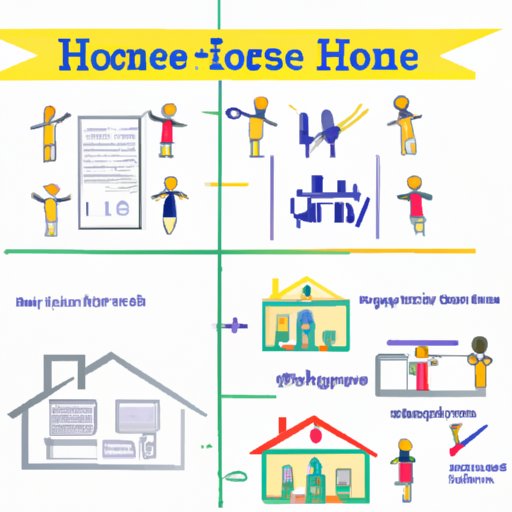Introduction
Home schooling, also known as home education or home-based learning, is an educational alternative in which children are educated at home instead of attending a public or private school. Home schooling is becoming increasingly popular in the United States, with more than 1.7 million students being homeschooled in 2019 alone.
While home schooling may be seen as an unconventional approach to education, it can offer many opportunities for both students and families. In this article, we will explore the different types of home schooling models, the resources available for home schooling parents, the academic performance of home schooled students, and the benefits and challenges of home schooling for families.

Pros and Cons of Home Schooling
Before diving into the details of home schooling, let’s take a look at some of the advantages and disadvantages of this educational option.
Advantages
One of the main advantages of home schooling is that it allows for more customization in the learning environment. Parents can tailor the curriculum to their child’s individual needs and interests, as well as adjust the pace of learning to their child’s ability. Home schooling also offers an opportunity to explore topics in greater depth than what is typically offered in traditional schools.
Another benefit of home schooling is that it allows parents to have more control over their child’s education. For example, they can choose to focus on certain values or beliefs, or ensure that their child receives an education that aligns with their own personal beliefs. Additionally, home schooling gives parents the freedom to make decisions about their child’s education without having to abide by the rules and regulations of a school district.
Disadvantages
Although home schooling has many benefits, there are some drawbacks to consider as well. One of the main disadvantages is that it can be time consuming and demanding for the parent. It requires a significant commitment of time and energy, as well as a knowledge of teaching methods, lesson planning, and other educational strategies. Additionally, home schooling can be expensive, as parents often have to purchase curriculum materials and other supplies.
Another disadvantage of home schooling is that it can be socially isolating for children. Without regular interaction with classmates, home schooled children may miss out on important social experiences and interactions, which can affect their overall development. Additionally, home schooled children may not have access to the same extracurricular activities as those who attend traditional schools.
Different Types of Home Schooling Models
There are several different models of home schooling, each with its own advantages and disadvantages. The most common models are the traditional model, online/virtual model, and hybrid model.
Traditional Model
The traditional model of home schooling is the most common type. In this model, the parent acts as the primary educator, providing instruction and guidance to the student. The parent is also responsible for selecting and purchasing curriculum materials, as well as creating lesson plans and assignments. This model is best suited for those who are highly organized and have a good understanding of educational strategies.
Online/Virtual Model
The online/virtual model of home schooling is growing in popularity due to the increasing availability of online courses and programs. In this model, the student completes coursework online, either through a virtual school or through an online platform. The parent is still responsible for providing guidance and support to the student, but the student is able to complete much of the work independently.
Hybrid Model
The hybrid model of home schooling combines elements of the traditional and online models. In this model, the parent provides instruction and guidance, while the student completes some of their coursework online. This model is best suited for those who want to combine the flexibility of online learning with the personalization of traditional home schooling.

Resources Available for Home Schooling Parents
In addition to the different home schooling models, there are many resources available to help parents make the transition to home schooling. These resources include local organizations, online platforms, and support groups.
Local Organizations
Local organizations such as homeschooling associations, co-ops, and support groups can provide valuable information and assistance to parents. These organizations often offer classes and workshops, as well as opportunities for socialization and extracurricular activities. They can also provide access to resources such as curriculum materials and other supplies.
Online Platforms
Online platforms such as websites, blogs, and forums can also be a great source of information and support for home schooling parents. These platforms provide access to resources such as lesson plans and curriculum materials, as well as support from other home schooling parents. Additionally, many online platforms offer virtual classes and workshops, which can be helpful for parents who are new to home schooling.
Support Groups
Support groups are another valuable resource for home schooling parents. These groups provide an opportunity for parents to connect with one another and share advice and support. Support groups can also provide access to resources such as curriculum materials and extracurricular activities. Additionally, many support groups offer field trips and other social activities for home schooled children.
Academic Performance in Home Schooled Students
Despite the fact that home schooling is a relatively new concept, research has shown that home schooled students tend to outperform their peers in traditional schools. Studies have found that home schooled students have higher scores on standardized tests and are more likely to attend college.
Benefits
One of the main benefits of home schooling is that it allows for more personalized instruction. Because the curriculum can be tailored to the individual needs and interests of the student, home schooled students often receive more individual attention and have more opportunities for enrichment. Additionally, home schooled students have more flexibility in their schedules, which can allow them to pursue their interests outside of the classroom.
Challenges
Although home schooling has many benefits, it can also come with some challenges. For example, home schooled students may lack access to certain resources that are available in traditional schools, such as specialized classes and extracurricular activities. Additionally, home schooled students may not have the same level of social interaction as their peers in traditional schools.

Benefits and Challenges of Home Schooling for Families
In addition to the academic benefits and challenges of home schooling, there are also financial and social implications for families. Let’s take a look at some of the benefits and challenges of home schooling for families.
Financial Impact
Home schooling can have a significant financial impact on families. While it can be less expensive than traditional schools in some cases, it can also be more expensive depending on the type of curriculum materials and supplies needed. Additionally, some states require home schoolers to pay tuition or fees for certain courses or activities.
Social Interaction
Another factor to consider when home schooling is the social aspect. Home schooled children may not have the same level of social interaction as their peers in traditional schools, and this can lead to feelings of isolation. To counteract this, parents should make sure to find opportunities for their child to interact with other children, such as through playdates or extracurricular activities.
Time Commitment
Finally, home schooling requires a significant commitment of time and energy from the parent. Not only do parents need to dedicate time to teaching and lesson planning, but they also need to make sure their child is getting enough social interaction and extracurricular activities. Additionally, home schooling can be demanding for families, as it can limit their ability to travel or take vacations.
Conclusion
Home schooling is becoming increasingly popular in the United States, offering parents the opportunity to customize their child’s education and have more control over their learning experience. There are many resources available to help parents make the transition to home schooling, including local organizations, online platforms, and support groups. Additionally, research has shown that home schooled students tend to outperform their peers in traditional schools. However, home schooling can also come with financial, social, and time commitments that may be challenging for some families.
Summary of Key Points
This article explored the different types of home schooling models, the resources available for home schooling parents, the academic performance of home schooled students, and the benefits and challenges of home schooling for families. Home schooling can be beneficial for both students and families, but there are also some drawbacks to consider. Ultimately, it is up to the parents to decide if home schooling is right for their family.
Final Thoughts
Home schooling is becoming an increasingly popular educational option for families. While it can be beneficial for both students and families, it is important to weigh the pros and cons before making a decision. With the right resources and support, home schooling can be a rewarding and enriching experience for both parents and students.
(Note: Is this article not meeting your expectations? Do you have knowledge or insights to share? Unlock new opportunities and expand your reach by joining our authors team. Click Registration to join us and share your expertise with our readers.)
